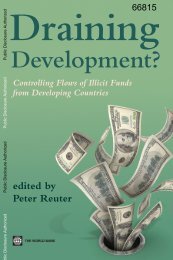managing risk.pdf
managing risk.pdf
managing risk.pdf
You also want an ePaper? Increase the reach of your titles
YUMPU automatically turns print PDFs into web optimized ePapers that Google loves.
Managing Risk and Creating Value with Microfinance89Natural disasters destroy the infrastructure that supports markets and provides basic needs. They washout roads and tear out train lines. They bring down hospitals, schools, government buildings, and otherbasic health and human services infrastructure. They disable telecommunications, which become overloaded asfrightened family and friends try to locate loved ones. No one escapes these impacts, but poor households andsmall businesses and microbusinesses are more directly and disproportionately affected.This chapter presents the different kinds of costs incurred by disasters. 1 In addition, this discussion focuses onnatural disaster preparation and how microfinance institutions (MFIs) and their staffs can respond. Preparationfor disaster includes understanding the <strong>risk</strong>s and costs of disasters, establishing proactive approaches andconcrete responses, and knowing the additional resources and partnerships that may prove helpful in anemergency. Although they are often triggered by natural events, disasters are also the result of failures—failuresof infrastructure, communications, financial services, and basic government services, among others. This chapterdiscusses the path to successful response to the failures made worse by natural disasters.An Unfortunate but Common StoryImagine the manager of a MFI arriving at the main office and finding windows smashed; the furniture,computers, and files destroyed; and the security system off-line. Even worse, most of the MFI’s staff membersfail to report to work, and the police condemn the office building as structurally unsafe. Is the manager preparedfor such a situation? Will the MFI be able to continue offering its vital services when they are needed most?This chaotic scene has been repeated worldwide—after earthquakes in El Salvador and Peru, hurricanes inNicaragua and Guatemala, floods in Poland and Bangladesh, and the tsunami in South and Southeast Asia. Ifthe MFI is like most such institutions around the world, it is completely unprepared for the destruction themanager finds—and the price to be paid by the MFI and its clients will be extraordinarily high.Disasters can affect MFIs in physical, financial, and human ways. Aside from the physical destruction andhuman tragedy, disasters pose an enormous <strong>risk</strong> to the loan portfolio. For example, heavily subsidized ordonated products—such as food and clothing from well-meaning donors—compete with the products fromlocal microbusinesses. The affected microbusinesses cannot compete; they will lose potential sales and willbe unable to make their loan repayment. This finding suggests a larger need for coordination as agencies andinstitutions come to the aid of disaster victims.However, in the face of such tragedies, MFIs have proven that they can be important partners in preparation fordisaster and postdisaster recovery efforts—thanks to their systems, products, and relationships with communityleaders and microbusinesses. If they are prepared, MFIs can contribute to timely delivery of essential goodsto affected neighborhoods. The MFIs may also need to respond with temporary changes in client selectionprocesses and loan review policies; to new policies for using reserves; to changes in collecting, rescheduling, andrefinancing; and even to a newly designed short-term loan product.Costs of DisastersThe costs can be extraordinarily high. Damages from Hurricane Mitch in Nicaragua in 1998 amounted toabout 45 percent of the national GDP. After the short-term destruction, the effects linger as tens of thousands1. This chapter is based on the February 2008 dialogue with Enrique Pantoja (World Bank) and Mike Goldberg (World Bank).
















